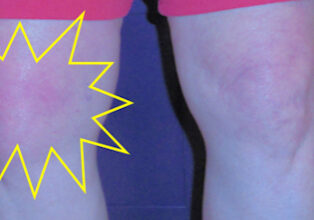How To Take Command Of Your Care When Your Doctor Goes Missing

Summer vacation this year was comprised of two weeks on a road trip with my husband as we left our (new) home in Florida, drove north to Upstate New York, then home again, visiting family and friends along the way. It was one of those vacations that you thoroughly enjoy, but then, can't wait to be home again! I never thought it would teach an important lesson about taking command of your care.
This year I had an extra reason to want to be home. About halfway into the trip, my knee began to hurt, then began to swell, becoming increasingly painful. There was nothing I could identify that would cause it. I found no injury, no bug bite, no known allergies, nothing. Further, ibuprophen, naproxen, heat, cold -- nothing would touch the pain. It grew worse and worse, hour by hour, mile by mile.
Now, before we go further, let me set the stage here.
I've spent the last 12+ years of my career preaching and teaching to other patients the wisdom of getting to know a doctor before you need that doctor for a difficult situation or emergency. Of course, that's not always possible, especially when a specialist is needed. But for primary care it should be a relatively easy thing to do.
Taking my own advice, after our move to Florida 15 months ago, I had researched possibilities and chosen the doctor I wanted. (We'll call her Dr. Mahoney). In this year+, I had visited Dr. Mahoney three times either for introductory purposes, or for those tests they give us age 60+ people (blood sugar, cholesterol, etc). I cultivated a good relationship so that when something dire came up, it wouldn't be my first visit to a stranger.
Now, suffering this most excruciating pain, my knee now the size of a football, we had arrived at that day of dire need. So I dialed.
"Dr. Mahoney is no longer with our practice. We've assigned her patients to Dr. Andrews. When would you like to come in? We're booking next Tuesday." Next Tuesday was five days away.
What? Oh no!
"Are you KIDDING? Where is she?" I demanded, thinking I'd just go track down Dr. Mahoney at whatever new practice she had joined.
"She and her husband have left the country," I was told.
When you are in that kind of pain, with something Dr. Google couldn't pinpoint, that kind of news just knocks you flat. Frustrated, hurting, upset, hurting, angry, hurting, dismayed, hurting.... For someone who is generally calm, who makes decisions confidently and easily, who copes with almost anything that comes down the pike - at that moment, I was none of those.
"I'll call you back!" I told the scheduler. I hung up the phone, totally thrown off. I couldn't get my arms around the doctor leaving! Between my painful knee, and my inability to see my doctor, I just could not think clearly.
My husband, who by then had kicked into gear as my advocate, delivered the most sage advice possible - the key to today's blog post.
"What are your options?" he asked me. "Why don't you write them down?"
That was a turning point. He brought me paper and a pen, and I wrote down three options. First, to see the doctor I had been assigned to. Second, to see another doctor in the practice. And third, to find another doctor in another practice. Of course, none of those options would get me to someone with whom I had cultivated a relationship. I was starting at square one no matter which option I chose.

Once I had written the options down, it was easy to eliminate two of them and move forward with the third. Finding a new doctor in another practice would mean starting from square one, needing to get all my records again, and more work for me. I hurt way too much for that. It was also easy for me to eliminate the doctor I had been assigned to. While he might be a very good doctor, he is male, and I knew I wanted a female doctor.
Three excruciating days later (with a weekend in the middle) I was able to see a nurse practitioner in the same practice. She was excellent. In fact, I like her better than I liked my original doctor! She ran some tests. She prescribed a steroid that, within 24 hours, had relieved all the pain and had reduced almost all the swelling. Relief. (Still no answers, though. No diagnosis. All known possibilities ruled out. Another story for another day.)
What I learned, and hope to share with you, is that too often, interacting with the healthcare system becomes a minefield, sometimes large, sometimes not as large. My missing doctor wasn't a huge minefield, but in my head, in my pain, it took on huge dimensions.
Here's your takeaway: When faced with these sorts of hiccups, one of the best thing you can do for yourself (or, if its your loved one who needs the help), is to write down your options.
Yes, write them down! Pen or pencil, on paper....The actual exercise of writing options down causes a few very useful things to happen. First, you begin to think about your choices, which is a proactive step toward controlling the situation. Just the writing itself begins to make you more bold, more confident. Further, once they are down in black-or-blue-and-white then you begin thinking more clearly about them. Making one of those choices begins to be less daunting. Forward movement becomes possible and furthers your sense of control over a difficult situation.
Granted, in this case, the options were actually quite easy to identify. I just needed a new doctor. But far more often, options aren't nearly so easy to identify. If those options must include medical information or treatment, we might not even know how to figure them out.
That is when you call in support, and when necessary, help from a professional. I needed my husband's clearer head because, well, he was clear. But if the input I had needed had been more about medical options, then a professional advocate would have been my choice.
Writing down my options changed the entire course of my care, all for the good. I highly recommend that you do the same, with the help of a professional as needed.
- Choosing the Right Doctor for Your Medical Care
- How to Make an Objective Medical Decision
- Are You Seeing the Right Specialist?
Find a Health / Patient Advocate or Navigator
Learn more about The Alliance of Professional Health Advocates
